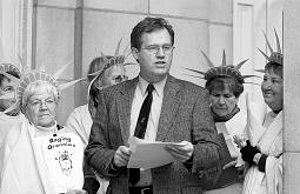By Meiling Arounnarath
Margaret Misch wore an orange jumpsuit with a black hood over her head, while a group of grandmothers dressed as the Statue of Liberty sang songs of peace Thursday.
Huddled with them beneath the roof of the Franklin Street post office, another group of 10 people read, one by one, the first 10 amendments to the U.S. Constitution.
They were, each in their own ways, marking a national holiday: Bill of Rights Day.
The Bill of Rights ensures U.S. citizens have the right to be tried in front of a jury and the right to bear arms, among many others.
It also also guarantees people the freedoms of speech and assembly, which Misch and the Raging Grannies were exercising inches from the cold, winter rain.
Misch, 75, who helped found the Orange County Bill of Rights Defense Committee after the Sept. 11, 2001 attacks, was protesting the treatment of detainees at Iraq's Abu Ghraib and Cuba's Guantanamo Bay prisons.
In addition to her outfit, Misch held a sign that read "We 'indict' torture" above an image of a red, octagonal stop sign. Instead of letters spelling out "STOP," the octagon framed a silhouette of a person in a hood and loose-fitting garment. Electrical wires dangled from the figure's arms and groin.
Torture is an inhumane way for the military, FBI and CIA to get information from prisoners, from "persons, no matter if they are a citizen, tourist or person with a green card," Misch said.
Beside her, the Raging Grannies, in pale green T-shirts and foam Lady Liberty crowns, took a lighter approach -- singing songs to protest the war in Iraq and the Patriot Act.
"We're the Raging Grannies singing our songs / Doo Dah, Doo Dah ... We don't like the Patriot Act / Doo Doo, Doo Doo."
Lori Hoyt, a mother of five and grandmother of 10, helped found the group.
"We started because we all just hold values that say violence does not make for a better place, war does not make for peace," the Carrboro resident said. "We're deeply concerned about what kind of world we're leaving to our children and our grandchildren."
Carrboro Mayor Mark Chilton and Chapel Hill Mayor Kevin Foy, who issued Bill of Rights Day proclamations in their towns, also participated.
"It's important to remember the basic principles on which our nation was founded, even if people are not always comfortable with hearing it," Foy said. "The freedom of speech and religion actually means something."

Chapel Hill Mayor Kevin Foy is flanked by Raging Grannies as he reads a Bill of Rights proclamation at the Franklin Street Post Office. From left are Jane Hare, Wynn Berg, Elisabeth Curtis, Ann Powers and Lori Hoyt.
(Editor's note: Joe helped organize this annual event at the Peace and Justice Plaza outside the Chapel Hill post office on Franklin Street. He was always one of the ten readers of the Bill of Rights.)







